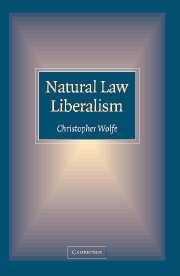Book contents
- Frontmatter
- Contents
- Acknowledgments
- Introduction
- PART I CONTEMPORARY LIBERALISM
- 1 Contemporary Liberal Exclusionism I: John Rawls's Antiperfectionist Liberalism
- 2 Contemporary Liberal Exclusionism II: Rawls, Macedo, and “Neutral” Liberal Public Reason
- 3 Contemporary Liberal Exclusionism III: Gutmann and Thompson on “Reciprocity”
- 4 Contemporary Liberalism and Autonomy I: Ronald Dworkin on Paternalism
- 5 Contemporary Liberalism and Autonomy II: Joseph Raz on Trust and Citizenship
- 6 “Offensive Liberalism”: Macedo and “Liberal” Education
- PART II LIBERALISM AND NATURAL LAW
- Index
2 - Contemporary Liberal Exclusionism II: Rawls, Macedo, and “Neutral” Liberal Public Reason
Published online by Cambridge University Press: 24 July 2009
- Frontmatter
- Contents
- Acknowledgments
- Introduction
- PART I CONTEMPORARY LIBERALISM
- 1 Contemporary Liberal Exclusionism I: John Rawls's Antiperfectionist Liberalism
- 2 Contemporary Liberal Exclusionism II: Rawls, Macedo, and “Neutral” Liberal Public Reason
- 3 Contemporary Liberal Exclusionism III: Gutmann and Thompson on “Reciprocity”
- 4 Contemporary Liberalism and Autonomy I: Ronald Dworkin on Paternalism
- 5 Contemporary Liberalism and Autonomy II: Joseph Raz on Trust and Citizenship
- 6 “Offensive Liberalism”: Macedo and “Liberal” Education
- PART II LIBERALISM AND NATURAL LAW
- Index
Summary
Classical Greek political philosophy maintained that all political regimes profoundly shaped the character of their citizens. This was not simply a choice, but a fact. The way of life of the polis or the political community – which was the framework for everything, including religion – was the broadest horizon for most people in the Greek and Hellenistic and Roman worlds. The rise of Christianity and its social dominance during the post-Constantinian era changed that perspective profoundly. Christian political thought, especially as found in the work of Augustine, dramatically expanded the human horizon by making men citizens of a “heavenly commonwealth,” one that transcended this world, and by so doing it “demoted” politics from its preeminent role in classical thought. Nonetheless, Christian political thinkers – following St. Paul, and especially with the embracing of Aristotle by Thomas Aquinas – continued to recognize an authority to foster virtue and punish vice in those who had charge of the political common good (albeit a more limited one, subject to a higher authority, the Church). If the earthly city was confined to dealing with temporal goods, those goods still included important religious and moral goods.
Liberalism brought with it a new understanding of the purpose of political life. As initiated in important respects by Thomas Hobbes and developed more fully in John Locke, liberalism maintained that the purpose of civil society and the state – a human invention to escape the difficulties of life in the state of nature – was quite limited: the protection of self-preservation and the rights essentially required for it, including liberty and property.
- Type
- Chapter
- Information
- Natural Law Liberalism , pp. 24 - 43Publisher: Cambridge University PressPrint publication year: 2006
- 2
- Cited by



